Turkey time at Coldwater Creek Farm
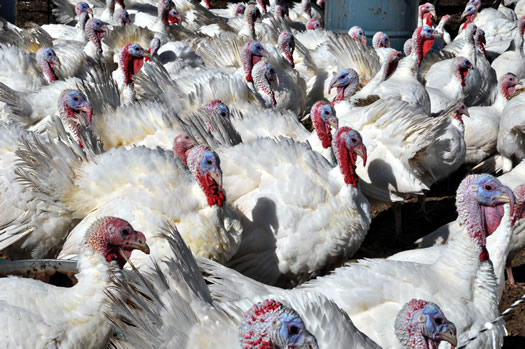
Gobble. Gobble.
James Kromer doesn't talk turkey.
So as he was driving 200 squawking, day-old chicks by car from a 50-year-old turkey farm in Boston to his Coldwater Creek Farm, his family's 26-acre property in southern Rensselaer County, he just cranked up the tunes.
"They just chirped the whole time. After about an hour and a half it bothered me so I turned up the radio and opened up the windows for some white noise," laughs Kromer, an accountant by day, who is marking his second year raising antibiotic-free, pasture-raised white Broad Breasted turkeys for Thanksgiving.
So, how does an accountant end up raising 200 turkeys?
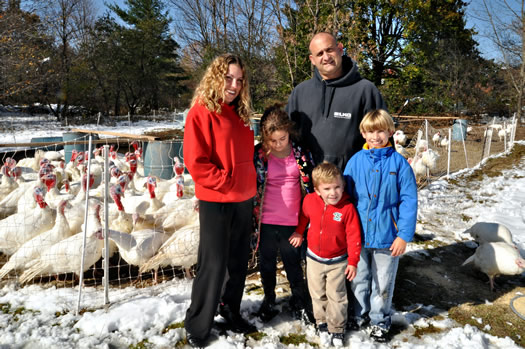
James Kromer and his family.
"It started with raising ducks and chickens as a family project," says Kromer, noting his family has as many as 35 laying hens they care for in addition to the 200-head turkey flock. This year they also raised cornish hens. They sell their eggs at local food co-ops and through word of mouth.
But the idea for raising turkeys really came from the family's inability to find fresh, local birds for Thanksgiving.
"We used to get our turkeys every year from Don Marsh at Marsh Farm in Kinderhook, but after Don died, his son Bill decided he couldn't raise turkeys and keep up with the 200-acre farm."
Kromer thought on it a while, and when he thought he could devote the time needed to raise turkeys, he went to Bill for advice. "He gave me lots of information. He told me where to buy the chicks, where to process the turkeys and said he would help me sell whatever I couldn't. Without him, I would never have taken on such an endeavor."
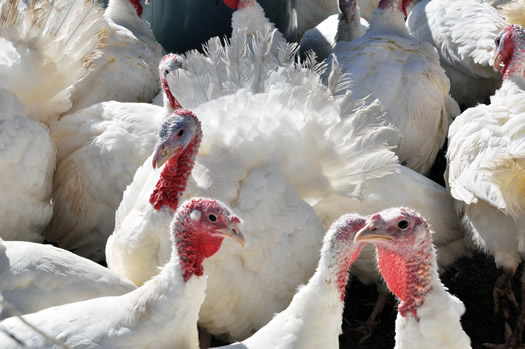
The Broad Breasted White variety Kromer raises is a cross between Broad Breasted Bronze and White Holland. The breed was developed at Cornell University in the 1950s and has become the most popular commercial turkey in the United States. According to Kromer, the birds never stop growing and can reach weights of up to 45 pounds.
"Their sole purpose is for meat. They can't live more than a few years."
Kromer toyed with the idea of raising heritage turkeys, but decided against it. "Heritage are slower growing and they have a gamey taste."
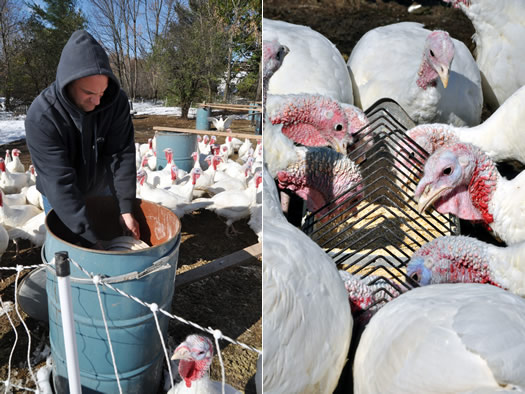
Instead, he decided the best thing would be to raise the most popular bird under the best possible conditions. He uses locally-grown grains from Gibson Farm in Castleton to augment the acres of grass and swarms of insects on which his birds ravenously feast.
"These guys are always on green ground," says Kromer, noting that he has to move the flock every 7 to 10 days in order to insure there's enough vegetation for them to eat. "And they're never medicated." Kromer says he isolates sick animals. He's learned that the injured ones recover on their own and the sick don't usually survive even when they are treated.
Keeping them on green grass has been a little more challenging this year than last. Flooding and storm damage took a toll on his property, so he's moved the animals across the street to his mother-in-law's house until his pastures recover. And then snow came and his plans to move them to green ground has had to wait.
"Everyone said I was lucky to have a dry year the first year I raised turkeys," Kromer says with a laugh. "I'm starting to see that."
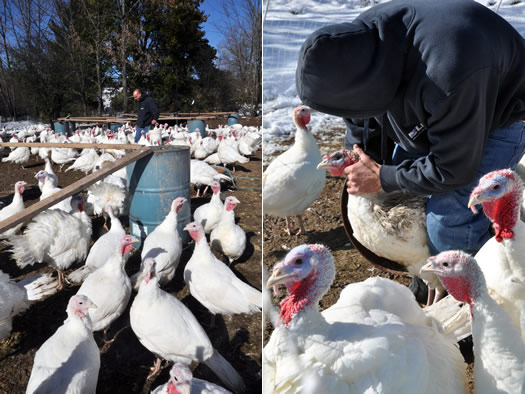
With the work involved in raising the flock, what with checking on them frequently, feeding twice a day, and keeping them from harm - even from harming themselves - being able to sell all of them is an imperative. But at $4 per pound, Kromer's turkeys are expensive. His birds range from 17 to 25 pounds, many averaging about 23 pounds.
Kromer says his customers tell him the birds are worth it. "It's arguably the most important meal of the year and fresh makes a difference. Most turkeys come from the south or the midwest and they can't be shipped fresh. Mine are local, they're fresh and there's no antibiotics. The three biggest things people tell me they want. They just want the best."
Even under the best conditions, getting an average of $60 or more per bird, Kromer says he barely broke even last year.
"If a turkey can find a way to die it will," he says. "They're not the smartest animal in the world," noting that he's had young birds drown in a few inches of water and entire flocks gather and stay in the middle of a road. "I think they went there because it was warm ... I had to have my son help me herd them back."
Aside from keeping them alive and laughing at their foibles, Kromer has a fondness for the creatures.
"There are really social, funny animals. The can see things much more clearly than we can. And one of them does something or checks something out, the rest of them follow. The all run under cover and huddle together, and I'll have to spin around to see what's happening. It could be a hawk a quarter-mile away or an airplane coming in for a landing at Albany Airport ... something I can barely see.
"They always let me know when I'm late with dinner," he chuckles.
Kromer's turkeys will be available for pick-up at the farm the Monday before Thanksgiving. Deliveries will also be made to a location in Hudson for Columbia County residents, as well as the the Nassau Community Food Compact, and Hometown USA in Clifton Park.
To find out more about Coldwater Creek Farm or to order a turkey, call 929-2358 or email jkromer@fairpoint.net.
Siobhan Connally shares her writing and photography at Ittybits & Pieces.
Hi there. Comments have been closed for this item. Still have something to say? Contact us.
Comments
Really cool project, but kind of a poor choice on the breed. Once you've had a heritage breed bird like a Narragansett or a Bourbon, you will never go back to a broad breasted white. Sometimes its okay not a eat a 30 pound all white/breast meat monster. $4 a pound is more than reasonable for a pastured bird, but seems hard to swallow when there are better options out there.
... said Bill on Nov 3, 2011 at 4:35 PM | link
This article reminded me to adopt my turkey from Farm Sanctuary. http://www.adoptaturkey.org/aat/issues/index.html So, thanks.
... said Vegetarian on Nov 3, 2011 at 8:35 PM | link